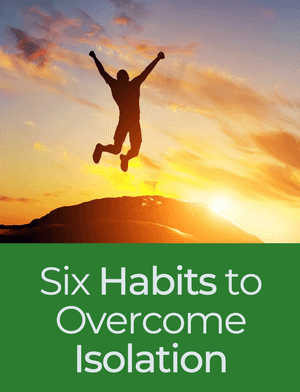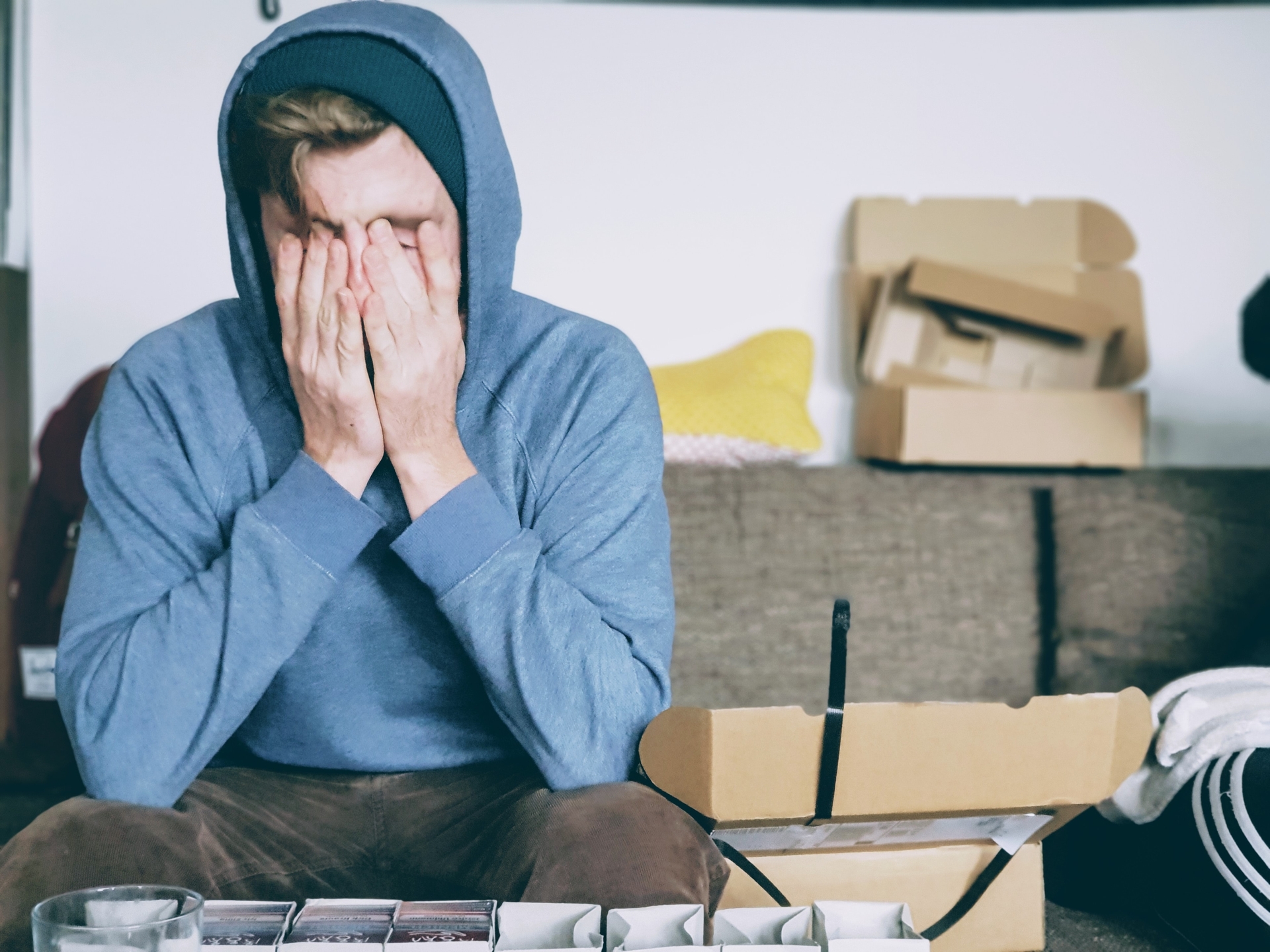
Get the Six Habits for Overcoming Isolation Guide for free


Have you ever felt like you were unable to maintain focus at work? Maybe you've been exhausted from the never-ending meetings or overwhelmed by all the DMs and emails you receive.
Listen to the podcast version here
If you're finding even the smallest of tasks debilitating you're certainly not alone. Many people suffer from burnout and neither the pandemic nor the rise of technology has helped us become any less overwhelmed.
In today's post, let's talk about what exactly burnout is, what causes it, and how to build awareness and habits in order to prevent and recover from it.
Burnout is a state of physical, mental, or emotional exhaustion caused by excessive stress and overwork. While it isn't an official medical condition, burnout has a significant impact on your productivity, creativity, relationships, and quality of life.
Burnout doesn't simply show up out of nowhere, its momentum builds each time you cross a personal boundary or spend effort on things that don't feel authentic to you.
While going through the discharge process from the US Air Force in 2017 I was taking college classes for computer science and desired to learn React in order to become hirable as a front-end developer. I would look at example projects and not understand a single thing of what I was looking at.
I remember one night where I couldn't solve a particular problem and spent 18 hours straight staring at my computer screen. Every bodily impulse was either ignored or simply not registered, and I didn't even notice the trance-like state I was in until after I snapped out of it.
What I didn't realize at the time was how much of a price I would be paying for forcing myself to "laser focus". The 18 hour debugging session was followed by extreme exhaustion, a lack of appetite, self-doubt, and incessant body aches.
To this day I still regularly experience burnout, but I have gotten better about recognizing which behaviors contribute to it and changing them each time I fail.
The emotional effects of burnout are many, but let's cover some of the most frequent and noticeable ones.
Feelings of loneliness are the result of not knowing what to do and feeling like you're on your own. You may have negative self-talk and consequentially choose to isolate yourself.
Self doubt can show up in many ways such as feeding your imposter syndrome or simply causing you to feel like you can't produce results.
Depersonalization is the result of no longer enjoying your work and can cause you to feel detached towards your friends, coworkers, and clients.
Feeling pressured can be caused by perfectionism because we feel weak when we are burned out, and when we feel weak we don't want to be seen making mistakes.
The physical consequences of burnout are just as severe as the emotional ones. Oftentimes they occur simultaneously and exacerbate each other. You may notice the following symptoms in your body:
Consistent body aches such as tightness, knots, headaches, upset stomach, joint and muscle pain, and other tension in your body.
Changes in sleep habits due to accumulated stress or the use of stimulants such as caffeine.
Changes in appetite such as eating less during stressful times or binging on snacks.
Sickness due to a lowered immune system caused by stress.
Mental or physical fatigue. Many of us sit at a computer for the majority of the day which causes pains, headaches, and eye strain. Additionally, jobs such as programming are cognitively demanding and without proper boundaries around taking breaks, you are exhausted quickly.
Since burnout affects us on both an emotional and physical level, it is only logical you may notice certain behavioral changes such as:
Isolation from friends and coworkers by declining invitations, avoiding interactions, and no longer having the energy for any kind of socializing.
Alcohol and drug use as an easy way out when we feel stressed, anxious, or sad and are an attempt to escape.
Procrastination and withdrawing from your responsibilities and commitments due to being drained and in doubt about your skills and abilities.
Reduced productivity due to feeling incompetent which causes a stagnation in your productivity. You may be worried you won't be able to complete certain tasks in time or complete them properly.
Now that we've covered how burnout show up emotionally, physically, and behaviorally, let's explore some of the causes of what cause burnout in the first place.
The awareness of the symptoms will help you recognize when you have burnout, and the awareness of the causes of burnout will help you prevent it.
Work causing a burnout is usually characterized by:
An unsupportive, unfair, or toxic environment due to a lack of trusting and supportive relationships with coworkers and clients, or work going unnoticed and other people taking credit for your work.
A lack of autonomy and control like being required to provide constant status updates, being micromanaged, or the inability to influence major decisions affecting your work, schedule, or career.
Stagnation or lack of visible results because of tedious and mindless tasks, or hard work on functionality that is not visible and appreciated by clients, resulting in feelings of apathy and disconnection.
Workloads exceeding your capacity push you to meet the demands of an increased workload but result in reduced motivation and chronic exhaustion.
Working from home contributes to social isolation and the inability to disconnect from work due to vague boundaries and decrease job satisfaction in seven out of ten workers.
A chaotic work environment caused by shifting requirements and priorities will result in feelings of overwhelm and exhaustion.
An absence of recognition or being deprioritized is debilitating when you put in a lot of effort the get the best results but don't receive the appropriate recognition or monetary compensation.
The work environment isn't the only cause for burnout, there are plenty of stressors in your personal life that may contribute to burnout as well.
A poor work-life balance such as prioritizing work over relationships, or overworking yourself, increase your chances of mental fatigue and social withdrawal.
Perfectionism puts you at the mercy of other people's opinion of you, and it will never be what you want it to be - not in the long term. Perfect is the enemy of good enough.
A lack of meaningful relationships causes you to miss out on vital resources for recovery. Meaningful relationships both help you prevent burnout by prioritizing properly and help you heal by providing a meaningful outlet.
A go-getter disposition such as the desire to take on a lot of responsibility and being overly competitive cause you to be more sensitive to stress and overwhelm.
Dereliction of your body and mind by not taking your health seriously, such as unhealthy eating habits or bad sleep hygiene, accumulates over time and predisposes you to be in a more vulnerable position.
Disregarding your thoughts, feelings, and desires is frequently caused by the chase for money and reputation.
Pessimism or nihilism is the result of feeling weak and threatened by the external world, causing anxiety and stress and increasing your vulnerability to burnout.
All the available information for preventing and avoiding burnout can be reduced into one simple formula:
Awareness + Effort = Resilience
In other words, recognizing the signs of burnout and putting in the effort to construct habits to manage it will increase your resilience to the next burnout.
Set boundaries and communicate them clearly. You aren't exhausted most by doing the things you enjoy, but rather by what others expect of you without wanting to. Next time a slack message is demanding your attention, try to see how long you can resist it.
Reduce social media usage so that you can feel more at peace throughout your day. When you are calm you spend less energy. Previously written
Block off your calendar in order to prevent others from intruding on your time. I'm a big advocate of helping others succeed, but you can only do so if you create the space to find calm.
Get outside and exercise so that you can release the negative energy you naturally build up during the day. Studies show "proximity to greenspace has been associated with lower levels of stress ... depression and anxiety
Get curious about your stressors and ask yourself if you see any repeating patterns. If you don't like a project you're working on or feel a lack of connection to your partner, it may be time for an uncomfortable conversation by remembering that growth is always uncomfortable.
Seek out community by developing continuous personal and professional relationships with coworkers, coaches, mentors, friends, and partners. Having community will contribute to your emotional and professional wellbeing.
If you believe this information can benefit anyone you know, please don't hesitate to share this blog post. You can also sign up for my newsletter on the bottom of this page to receive blog updates (never spam), and you will receive the 2022 React Developer Roadmap for free.

Get the Six Habits for Overcoming Isolation Guide for free
Subscribe for Updates
Get the Six Habits for Overcoming Isolation Guide for free